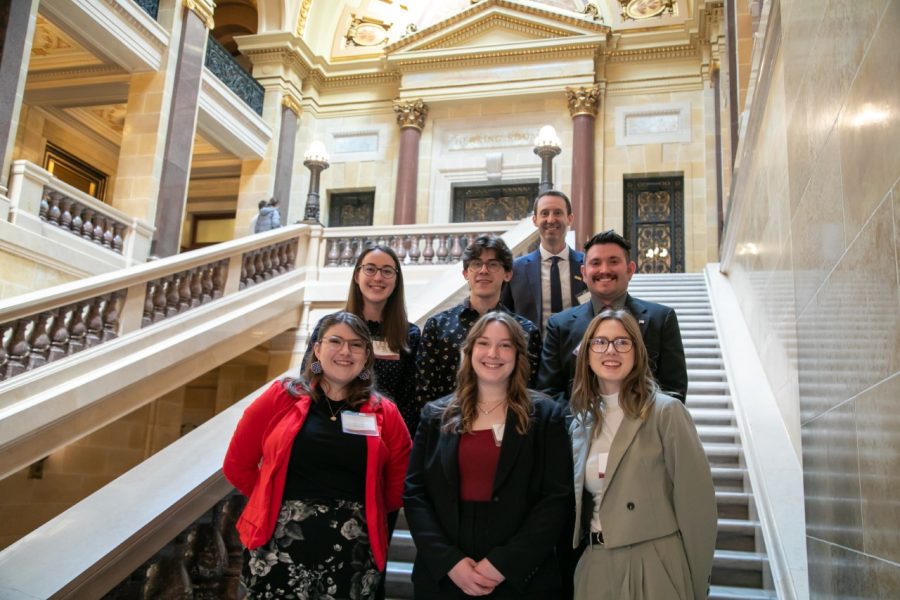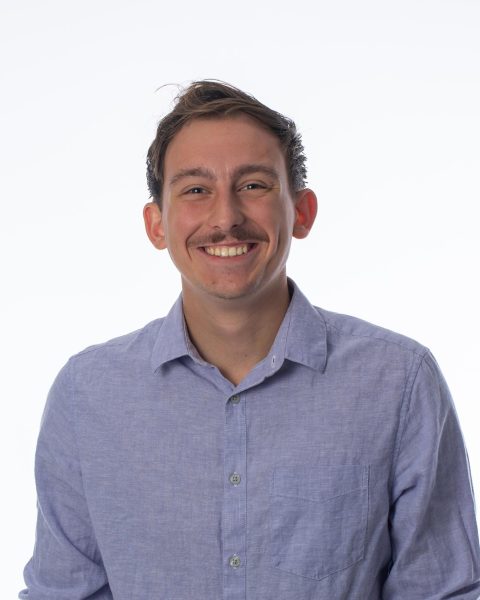UWL students showcase research findings in State Capitol
Brandon Micech, Sarah Fleegal, Josie Lammers, Ky Ariano, Maddie Riddle, and Faith Kalvig. Photo retrieved from uwlax.edu.
April 11, 2023
On Wednesday, March 8, six students from the University of Wisconsin-La Crosse (UWL) attended the 19th annual Research in the Rotunda at the State Capitol, an event that allows students to present their undergraduate research in the heart of Madison. At the event, six UWL students presented their research findings to Wisconsin legislators, UW alumni, state leaders, and other supporters.
UWL students who presented research at Research in the Rotunda include Brandon Micech, Sarah Fleegal, Josie Lammers, Ky Ariano, Maddie Riddle, and Faith Kalvig.
The students were led by Nicholas Bakken, UWL professor and student research and experiential learning coordinator. After appearing at the capitol almost one month ago, The Racquet Press asked participating students to describe their projects and what they researched.
Brandon Micech, a finance major from Menomonee Falls said his research was focused on “creating a stock model for the Gordon Spellman Fund.” In his research, Micech, “developed a tool for students to select high-quality stocks for their semester-long projects.”
Micech continued, “Using FactSet, the research aims to determine the model’s reliability in predicting future returns, using 20 years of monthly data for 3,914 unique stocks from the entire U.S. index.” He said, “I am excited to have the model be introduced to students next semester and its future impact on the Spellman Fund.”
Sarah Fleegal, a microbiology major from Green Lake said, “My research project involves working with a bacteria called ‘Staphylococcus aureus’ (S. aureus). S. aureus [that] causes hundreds of thousands of skin and soft tissue infections in the United States each year. These infections are especially hard to treat when the bacteria forms a biofilm, a slimy layer that protects the bacteria from antibiotics and helps it stick to tissues in the body.”
Fleegal continued, “I research how S. aureus regulates biofilm formation by studying point mutations in a gene called brpS….It was really rewarding to be able to present my research to the public and state legislators. It made me feel very proud of the education and opportunities I have received here at UWL.”
Josie Lammers, a chemistry and biochemistry major from Waukesha said, “We are researching a protein called DcrB, which is a protein from salmonella enterica that has been shown to be required for the bacteria to survive toxic amounts of copper. This protein may allow salmonella to survive the high concentrations of copper that are used by mammalian immune systems to defend against pathogens.”
Lammers continued, “My project focuses on investigating this protein’s lipid-binding properties and structural requirements for function. We are interested in studying this protein because proteins involved in copper resistance are potential targets for the development of new antibiotics.”
Faith Kalvig, an archaeology and anthropology major from Fitchburg said, “My research focused on comparing historical artifacts from two different archaeological sites on the Red Cliff Indian Reservation, Gaa-Miskwaabekaang. The most important part of my research is that it was done in collaboration with and directed by the Red Cliff Tribal Historic Preservation Office.”
Kalvig said she was excited to attend Research at the Rotunda to discuss “the importance of collaboration with descendant communities when conducting archaeological research.” She continued, “The experience of Research in the Rotunda itself was eye-opening because I had not been previously exposed to or aware of all the other kinds of research projects happening both at UWL and on UW-System campuses across the state.”
According to a UWL news release, “Ky Ariano, a microbiology major from Geneseo, Illinois, researched ‘Determining the functional role of the GOX1969 protein in gluconobacter oxydans.’”
Maddie Riddle, a sociology and criminal justice major from Waterloo researched, “Reducing Risk upon Reentry: An Examination of Health Risk Behaviors among Incarcerated Women with a History of Drug Abuse.”
Upon attending the event, faculty lead Nicholas Bakken said, “Research in The Rotunda is such a unique opportunity to showcase the amazing research being done by UWL students to a diverse audience that includes Wisconsin legislators, state leaders, and members of the public.”







